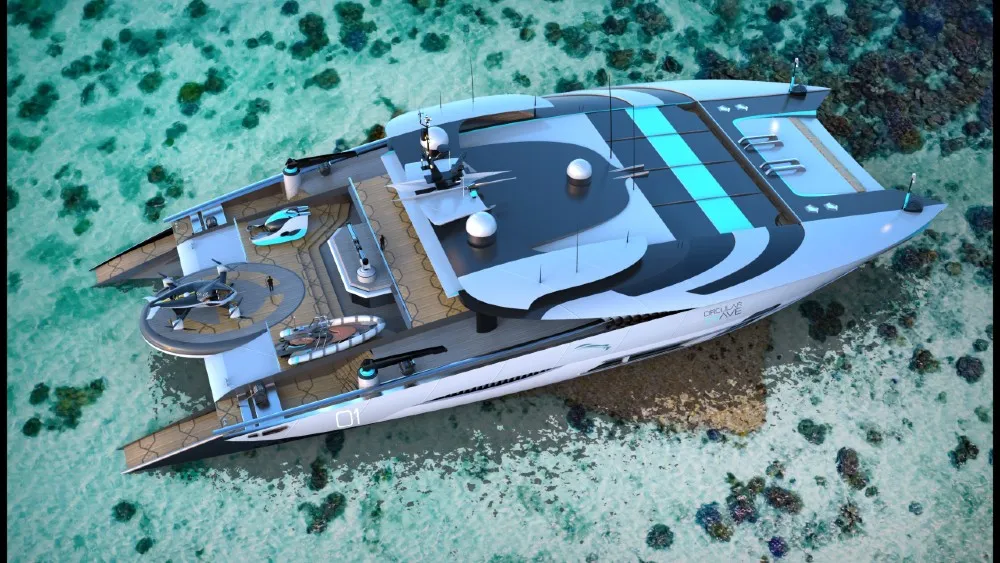Some are fantasy, others could be built right now. All seven offer a glimpse of yachting’s future.
Yacht concepts are the lifeblood of innovative design. From alarmingly surreal creations made with AI software to Feadship’s attempts with its 272-foot Dunes concept to build a net-zero superyacht, the attention-grabbing concepts create a diverse melting pot of superyacht design.
Take Pegasus, the 290-foot concept designed by Jozeph Forakis. It was pitched as the world’s first 3-D-printed superyacht. It’s designed to be constructed using robotic printing to create a mesh framework integrating both hull and superstructure. This build method would require less energy, material, waste, space, and time than a traditional new build vessel.
Aside from mirrored wings and an aquarium-style lap pool, the yacht’s standout feature is a multi-level “tree of life” hydroponic garden used to grow fresh produce and provide onboard air purification. According to the designer, who claims to have imagined the concept while on a beach on a Greek island, Pegasus has been developed with a “science fact, not fiction” philosophy.
Forakis says the concept is “bold but achievable, where man and machine live in harmony with nature.” That may be an overstatement, but it does underline where inspiration for many concepts originate—an idea that goes beyond technology and the ways designers see for improving life on board.
From the sublime to the ridiculous, superyacht concepts are always food for thought. These seven new concepts illustrate just how far designers are willing to go to capture the imagination.
Lazzarini Design’s Outrageous
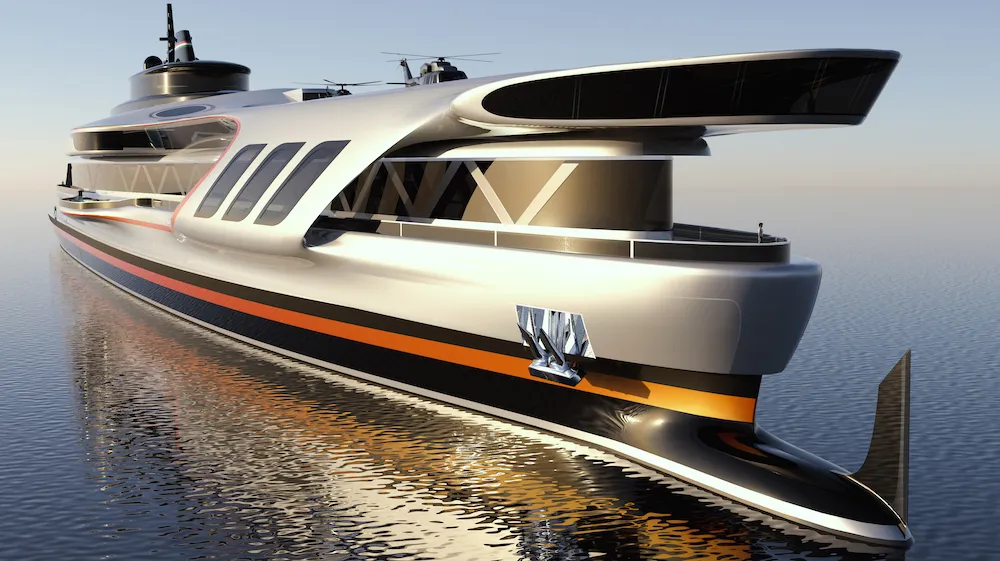
Perhaps the most outrageous thing about Lazzarini Design’s concept is the eye-popping 1,056-foot length. It’s inspired by a hammerhead shark with a gray exterior paint job, a bank of windows like the shark’s triangular, serrated teeth, and a secondary layer of glass that mimics gills. Most striking is the forward area with a large top deck that extends over a bulbous bow to echo the hammerhead’s signature head shape. Amenities include a double helideck, a private tender port at the stern, solar panels, and five pools, including one with a large patio area open to the elements and surrounded by grass, with another positioned on the main deck side balcony.
J. David Weiss’s Circular Wave
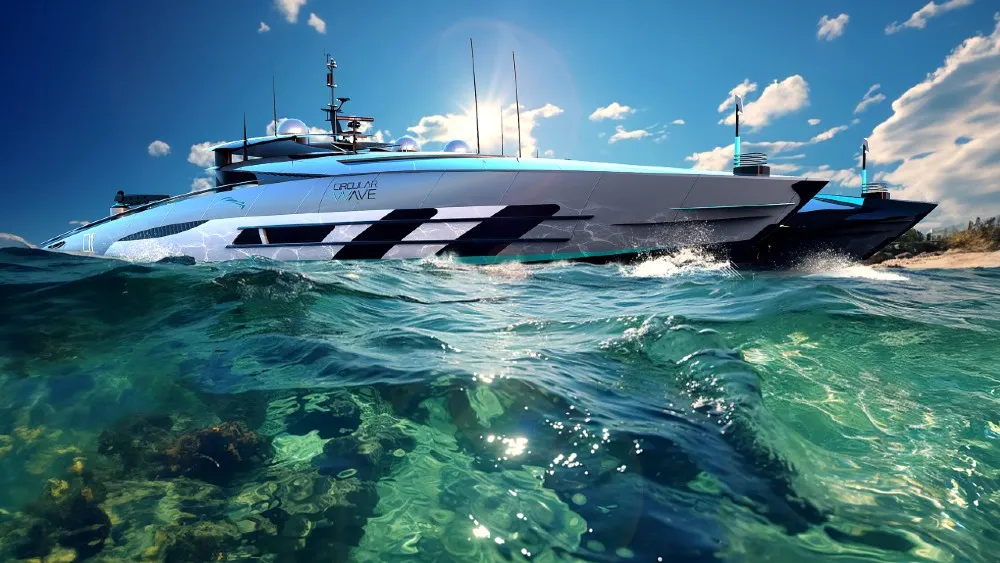
J. David Weiss is known for his out-of-the-box yacht designs, and his latest concept Circular Waves is no different. The 262.5-foot hybrid power catamaran is a floating research platform that aims to find sustainable solutions to the ocean’s trash problem. It uses a “scoop” between the hulls to collect plastics, fishing nets and brown algae, which is then processed onboard and converted into biofuels in its laboratory to power the yacht’s electric and hydrogen systems. Featuring a media room, submarine, two tenders, and a skydeck for landing drones and a helicopter, the concept forms part of a nonprofit organization founded in Monaco in partnership with the Technical University of Munich.
Leoni Design’s FY69
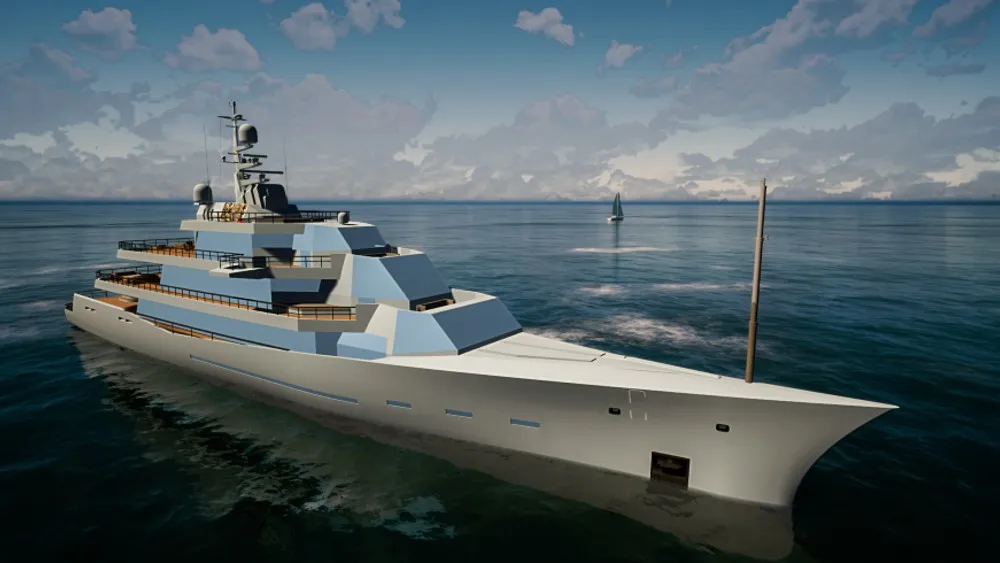
Based on a 226-foot naval frigate, Leoni Design‘s FY69 enjoys sleek, aerodynamic lines that cut through waves with speed and stability. The exterior is covered in polished metallic accents, while the interior combines marble, exotic woods, and plush furnishings for a refined finish. Advanced navigation systems and eco-friendly propulsion is twinned with a glass-bottomed pool and a large collection of water toys. Accommodating 12 guests in six cabins, with a crew of 17, the F769 has a high-tensile hull and a predicted top speed of 17 knots.
ThirtyC’s Shard
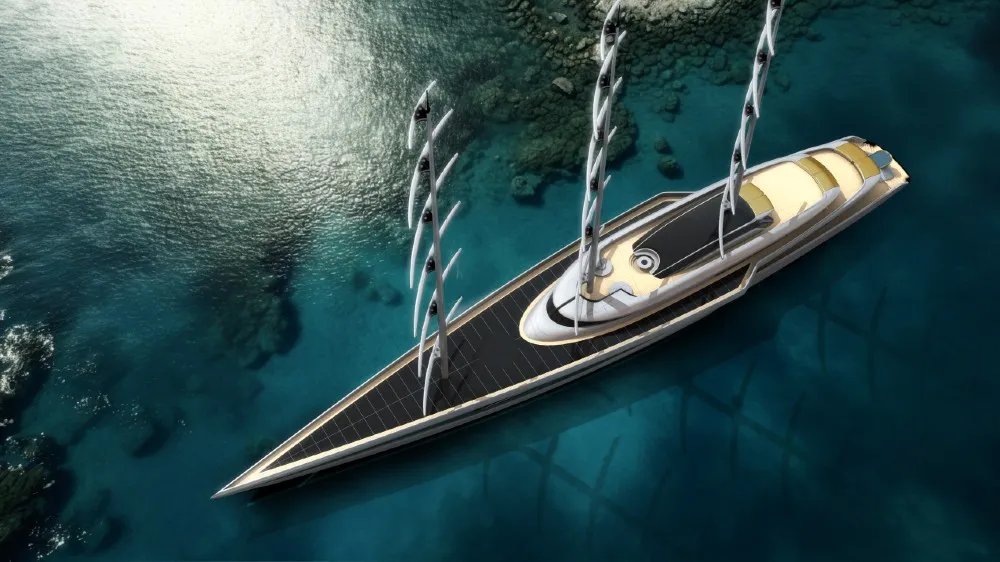
The 403.5-foot Shard penned by British studio ThirtyC takes its name from the numerous glass elements that adorn its exterior. Large panes of glass are strategically placed to provide panoramic views from multiple areas, while floor-to-ceiling windows in the lounge and dining areas allow natural light to fill the interior and create a connection with the surrounding seascape. The yacht is fitted with solar panels to reduce its environmental impact and ensure a quieter cruising experience. Alongside a spa, wellness center, gym, and cinema, there is a sundeck Jacuzzi and a dedicated beach club where guests can enjoy the yacht’s range of water toys.
Christian Leyk’s Passepartout
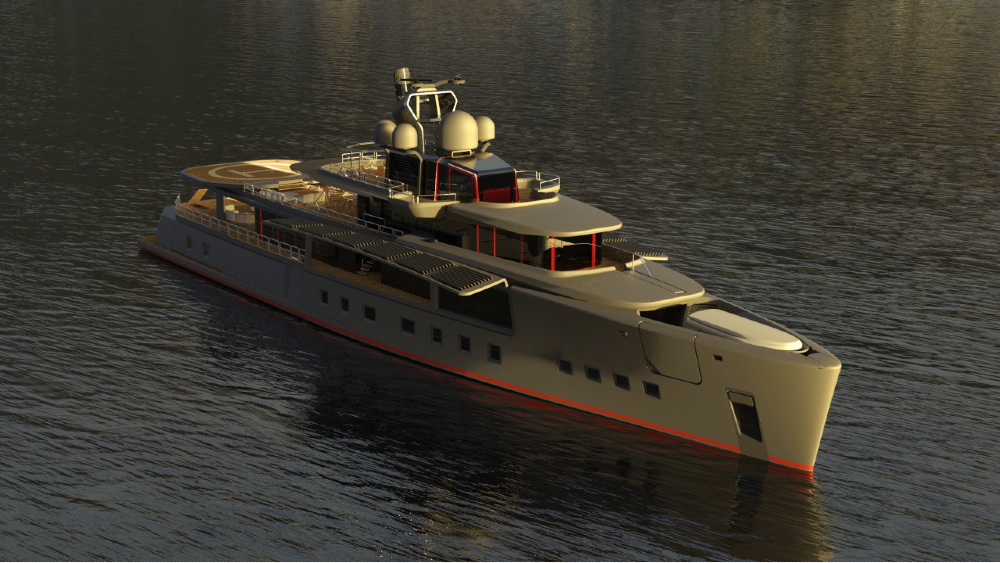
A 223-foot no-nonsense explorer is the premise of Passepartout. Named after Phileas Fogg’s companion and meaning “goes everywhere,” Passepartout is an all-aluminum yacht conceived for world circumnavigation. “The hull is relatively narrow because the focus is on efficient cruising, while being safe and comfortable in all weather conditions,” designer Christian Leyk tells Robb Report. Key features include the owner’s cabin on the main deck forward with folding balconies and a private “garden” forward of the en suite, as well as shutters that fold across the side decks to provide protection when cruising in colder climates or shade from the sun when in sunnier destinations.
T. Fotiadis Design’s Velvet Sky
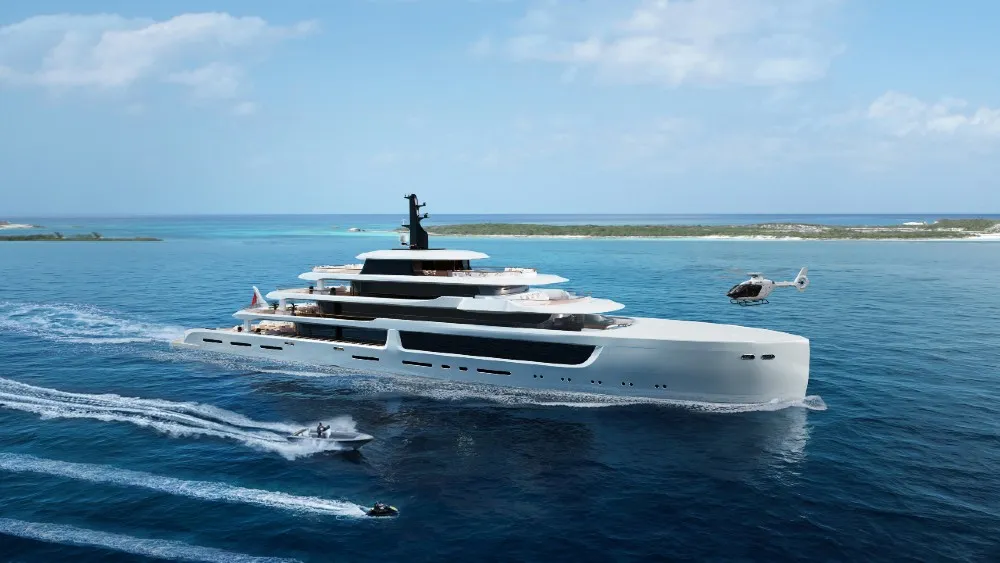
The 269-foot Velvet Sky designed by T. Fotiadis Design is distinguished by a water-level profile that the designer claims will redefine the concept of on-water entertainment. “The challenge was to maintain a low profile without compromising on the extravagance associated with superyachts,” Fotiadis tells Robb Report. The main deck has a 9.2-foot-high interior ceiling with large panoramic windows and a sense of openness akin to a waterfront villa. It’s inspired by the desire to create an atmosphere where guests can revel in sunny days surrounded by the beauty of the sea and connected to the elements. This is most evident at the stern, where the open deck aft blends into the full-beam beach club for direct access to the water.
Jay Aberdoni’s Arrakeen
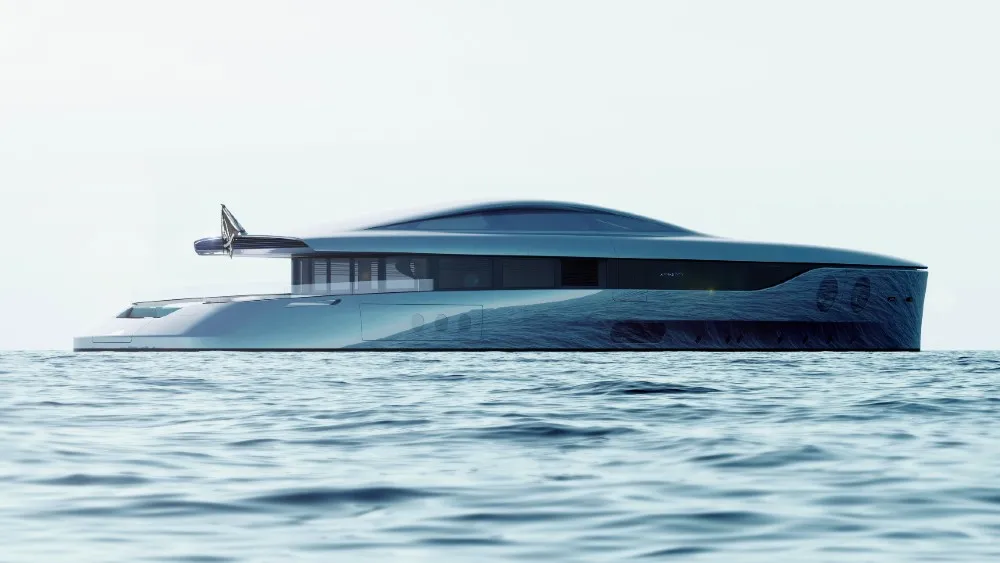
Arrakeen by Jay Aberdoni is a retro-futuristic 230-foot diesel electric concept in which aesthetics come first. The design takes influence from the automotive industry, with a low profile, fluid classic car shapes, and gullwing doors on the upper deck that open to reveal a dining area with a glass balcony on each side. There are two pools, including a private Jacuzzi forward that is only accessible from the owner’s cabin via a glass hatch in the foredeck. “It all amounts to a highly minimalistic and yet aggressive yacht with the sole aim to make us dream of what a future could look like, from a retrospective point of view,” Aberdoni tells Robb Report.

